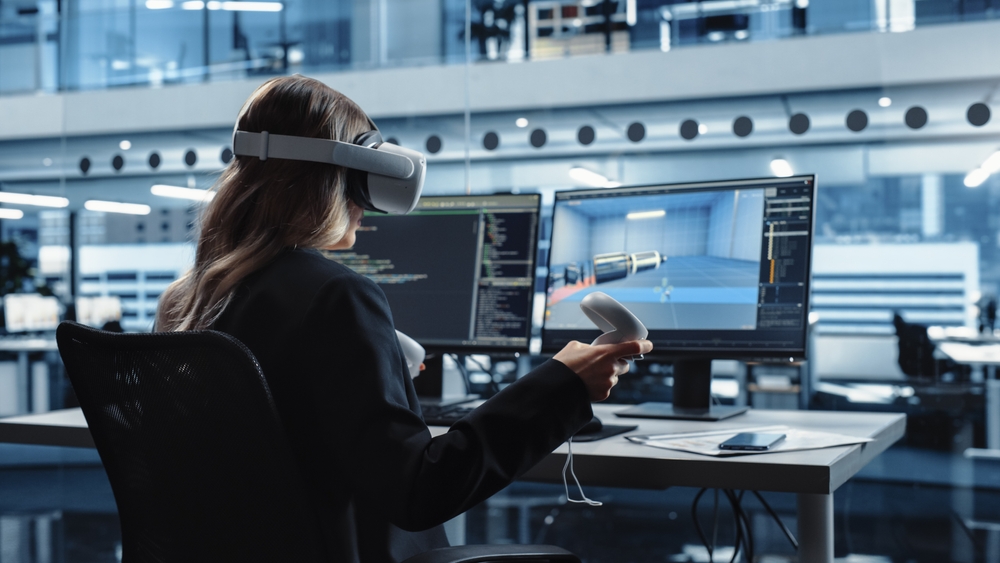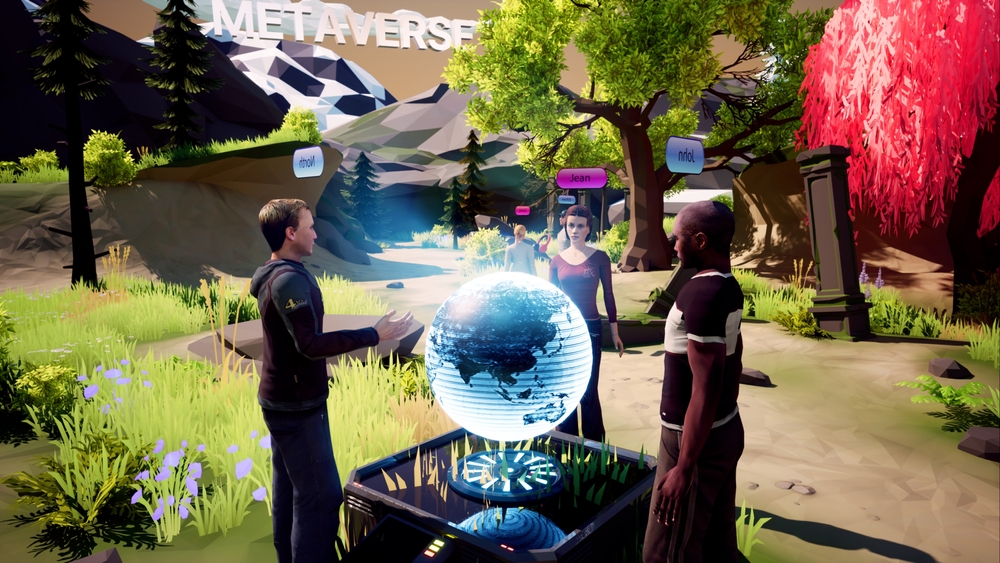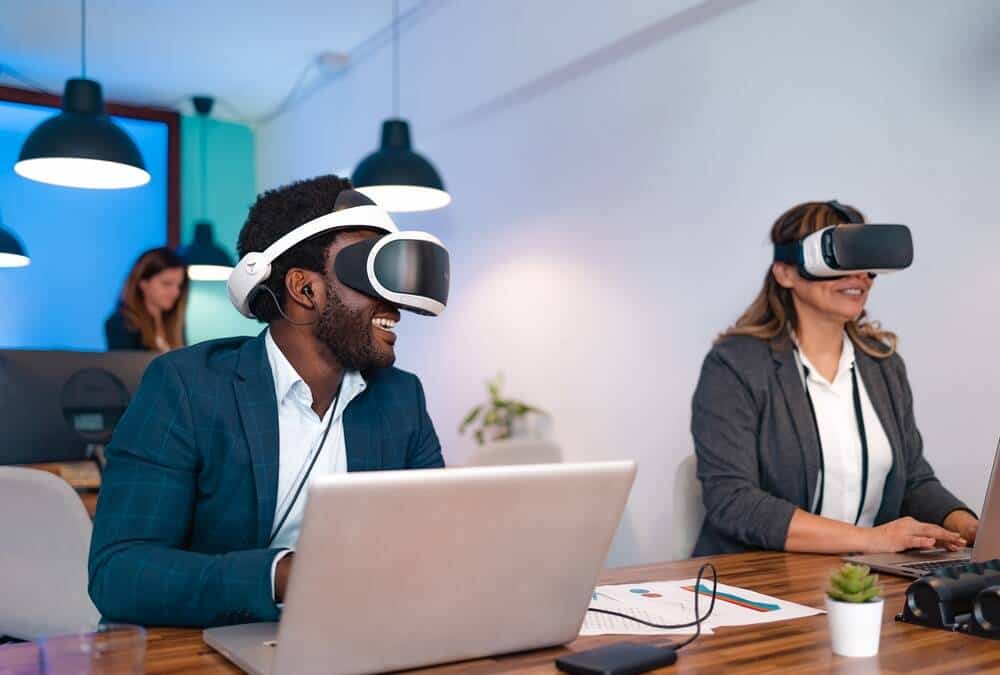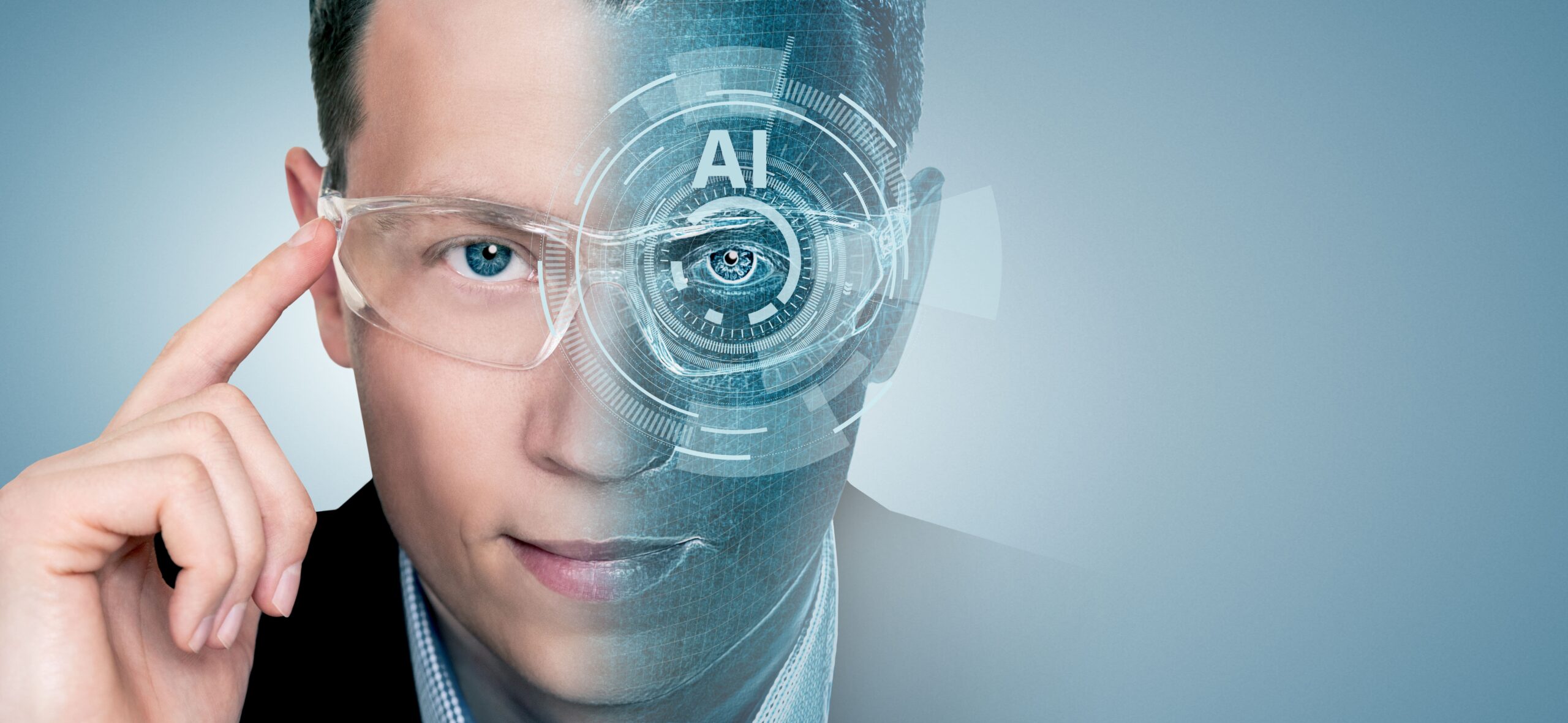- The metaverse is fast becoming big business
- Redefining the way we work
- Metaverse workplace solutions
- We will work alongside human-like digital colleagues
- Downsides and important considerations
- Working in the metaverse: interesting facts and figures
While today’s workplace is already completely different from what we were used to a few decades ago, the emergence of the metaverse will enable even more unimaginable changes. Think a myriad of options for connecting, collaborating, and even ‘teleporting’ to the virtual equivalents of real-world places – or completely new and imagined ones. The potential possibilities of the metaverse are too vast to comprehend, but could include having virtual team meetings on the beach in the morning, and then attending a holographic presentation in space in the afternoon. Or virtually beaming yourself from your office in Amsterdam to have a business lunch with a potential client in Singapore – all without ever setting foot outside. And if your workload gets too overwhelming, you can send your AI avatar to attend that brainstorming session in New York on your behalf.
As we already mentioned in our first article about this exciting topic, the metaverse is basically a universe beyond real life. It’s a next-level immersive social network and Internet of Things platform – a virtual copy of the real world in which everything is interconnected and where the virtual has the same level of permanence as the real. And not only does the metaverse parallel the real world, it is also very much an extension of it.
In the years ahead, the metaverse will infiltrate every sector and represent a market opportunity of more than $1 trillion in annual revenues.
JP Morgan
The metaverse is fast becoming big business
With tech giants like Meta, Microsoft, Google, Intel, Unity Software, Epic, Apple, Niantic, and many others getting in on the action and creating their own virtual worlds, the metaverse is fast becoming big business. According to JP Morgan, in the years ahead, the metaverse will infiltrate every sector and represent a market opportunity of more than $1 trillion in annual revenues. Mark Zuckerberg is planning to invest over $10 billion in the development of software and hardware for the metaverse and says: “The metaverse will be the biggest opportunity for modern business since the creation of the internet”. And Alberto Rosas, co-CEO of Gamium, a metaverse technology company whose mission is to create the first metaverse that interconnects all of them, says: “We anticipate that there will be constant economic activity within the metaverse. In reality, it is a world that coexists parallel to the physical world and that can be monetised in infinite ways. You can charge a commission for each transaction that is made. You can sell clothes and items for your avatar, create exclusive games that you can only access if you pay, or monetise through ads in the metaverse itself”.
Redefining the way we work
Now that hybrid and remote working are becoming more and more prevalent – and are likely here to stay – the metaverse will eventually completely transform the way we work, providing us with amazingly life-like virtual spaces for communication, creativity, and collaboration, and access to benefits like shared content and data, without having to be present – in person – in the same space as your coworkers. Working in the metaverse will decouple physical locations from work opportunities, expand the talent pool, and provide a plethora of options for a healthier work-life balance. It will help us unlock new levels of creativity as it will enable us to visualise and solve problems in 3D, and create product designs that we can share with customers for approval. Working in the metaverse will make it possible to experiment with prototypes in a safe, interactive environment – such as creating the blueprint for a new machine and easily changing design elements and materials, without the risk of accidents, or wasting money or materials. And while the metaverse still sounds rather sci-fi and will definitely not materialise overnight, the potential benefits of working in the metaverse do appear to be virtually limitless.

Metaverse workplace solutions
To get started on working in the metaverse, the very minimum you’ll need access to is a computer and a VR enabled headset. But to offer full immersive (work) experiences, many companies are already working on computer-generated holography that can be experienced via virtual viewing windows or by specifically designed holographic pods that can project images or people into space – for instance during events like meetings or brainstorming sessions. Some companies are working on creating haptic feedback technology for the metaverse, which will enable users to interact with virtual objects and even ‘feel’ pressure, texture, and movement. Here are some examples of metaverse workspace solutions.
“In many ways, the metaverse is the ultimate expression of social technology”.
Mark Zuckerberg
Horizon Workrooms truly transforms the workplace
Facebook (now Meta) has always claimed that virtual reality (VR) and augmented reality (AR) can truly transform the workplace. And the shift to remote and hybrid working provides the tech giant with a great opportunity to showcase just how this can be done. Meta’s Horizon Workrooms app, in combination with an Oculus Quest 2 headset, provides a new way for remote employees to efficiently collaborate in virtual spaces with spatial sound, hand tracking, and a multiplayer VR playground. Horizon Workrooms contain digital whiteboards and people are represented with customisable and animated avatars of themselves. Inside this virtual collaboration space, you can see your computer screen and keyboard, interact with your colleagues, have brainstorming sessions, and give presentations – just as you would in a real-world meeting room. A Horizon Workroom can accommodate up to 16 people, and another 34 people can join via video call without having to wear a headset. Horizon Workroom features include speech to text, advanced brainstorming, sticky notes, 3D mind mapping, and more. “In the coming years, I expect people will transition from seeing us primarily as a social media company to seeing us as a metaverse company. In many ways the metaverse is the ultimate expression of social technology”, said Mark Zuckerberg.
Avatar-based immersive reality platform tackles disconnectedness
The avatar-based immersive reality platform NextMeet focuses on interactive, immersive workplace solutions. The mission of the company, which is based in India, is to offer solutions for disconnectedness among employees, which is often a result of remote work. NextMeet’s immersive platform is accessed via mobile or desktop devices. Users create a custom avatar or pick one from a series of standard avatars. The avatars enable employees to walk in and out of virtual offices and meeting rooms in real time, give live presentations, walk to a virtual help desk, and much more. For onboarding purposes, the company has created a 3D gallery with interactive stands where new employees can be introduced to and explore the new company. Pushpak Kypuram, founder-director of the company, explains: “With the shift to remote working, keeping employees engaged has become a top challenge for many companies. You can’t keep 20 people engaged in the flat 2D environment of a video call; some people don’t like appearing on camera; you’re not simulating a real-life scenario. That is why companies are turning to metaverse-based platforms”.

Build your dream office in adventurous (pretend) spaces
Imagine being able to introduce elements of adventure, surprise and spontaneity to your daily working environment, instead of having to make do with a uniform, boring corporate office setting. The international VR platform Gather enables you to create all kinds of exciting work spaces. Some examples include ‘The Pirate Office’, boasting a captain’s cabin and beautiful ocean views, or ‘The Space-Station Office’ with views of planet Earth. For out-of-the-ordinary settings for meetings or brainstorms, you can choose from options like ‘Zen Gardens’ or ‘Rooftop Party’. In the future, the metaverse will enable you fully customise your work environment to your specific requirements – whether you prefer a beautiful desert island somewhere, a cabin in the woods overlooking a gorgeous river, on top of the Eiffel Tower in Paris, or even a spot next to the Victoria Waterfalls in Zimbabwe.
“We will be able to send off hyper-realistic digital twins of ourselves into the metaverse to work for us while we play golf or lie on the beach. That’s a version of the world of the future”.
Greg Cross, Soul Machine
We will work alongside human-like digital colleagues
Working in the metaverse will not only mean that we will be introduced to the avatars of our real-world coworkers. We will eventually also be collaborating with AI-powered and incredibly human-like digital assistants and colleagues who will take over many of our tasks and free us up for more valuable, human-centric work. These digital colleagues are powered by computer vision, natural language understanding and processing, and simulation technologies, which enables them to interpret context, make human-like gestures, understand and show emotions, and make decisions. These AI-powered human-like bots – also known as digital avatars – are complex ‘beings’ that enhance human interaction by communicating with people. They learn in various ways; not only through how their algorithms are programmed, but also through their experience with ‘colleagues’. Digital humans are extremely scalable and can be deployed in multiple locations simultaneously.
The New Zealand-based tech startup Soul Machines, for instance, uses a technique called ‘cognitive modelling’ to recreate the human brain’s emotional response system to enable the construction of autonomous animated characters. The technique makes use of computer vision, machine learning, real-time gesturing, gaze direction, and expression rendering to create lifelike, emotionally-responsive digital ‘humans’. These ‘entities’ can be deployed in roles like educational coach, skincare consultant, real estate agent, healthcare advisor, and many others. Soul Machine’s cofounder Mark Sagar won Academy Awards for his AI engineering efforts creating the characters in the movies ‘Avatar’ and ‘King Kong’. Soul Machines has already partnered with the World Health Organization (WHO) to create the virtual health worker Florence, who provides digital counselling services to people who want to quit smoking or learn more about COVID-19. Soul Machines envisions a future in which people can create digital replicas of themselves. Greg Cross, Soul Machine co-founder and chief business officer says: “We’re very much on the path to creating at some point in the future these hyper-realistic digital twins of ourselves and being able to train them just by interacting with them online. And then being able to send them off into the metaverse to work for us while we play golf or lie on the beach. That’s a version of the world of the future”.
“Virtual workplace software could lead to more employee tracking, some of which sounds creepy. If the software is tracking your eye movement, for example, an eye-roll could be logged, or even matched with biometric data to provide clues about your emotional state”
Kurt Opsahl
Downsides and important considerations
For the many benefits of working in the metaverse, there are various downsides to take into account as well. Developing a comprehensive metaverse for work – which will need to encompass efficient, fast-paced working experiences and processes – would require the most advanced technologies, hardware, software, and enormous amounts of bandwidth. Then there is the issue of privacy and security. How will sensitive information be harvested, shared, stored, and protected? We already have privacy concerns when we browse the ‘normal’ internet, and the tech that is used to track our behaviour online will also exist in the metaverse – and we can safely assert that this tracking will become even more ubiquitous and invasive. VR headsets, for instance, make use of eye-tracking technology, which enables marketing companies and other parties to determine how long we look at what – and monitor, analyse, and even register our physical and emotional responses during our immersive experiences. According to Kurt Opsahl, general counsel of the privacy-watchdog group Electronic Frontier Foundation, “Virtual workplace software could lead to more employee tracking, some of which sounds creepy. If the software is tracking your eye movement, for example, an eye-roll could be logged, or even matched with biometric data to provide clues about your emotional state”.
The fact that we will be using avatars in these virtual worlds will also make us vulnerable to being hacked and having our online identities stolen – which could cause serious havoc, not only in the virtual world, but in the real one as well. What’s more, many people who engage in VR experiences struggle with so-called post VR hangovers, sadness, comedowns, or even depression. Which is not surprising if you consider that some people’s real lives pale in comparison to these incredibly immersive realms where anything is possible. Having to return to your daily struggles after spending prolonged amounts of time in the metaverse can become increasingly problematic the more life-like and incredible our immersive experiences become. And considering the fact that internet and smartphone addiction is already a huge – and increasing – problem, you can imagine that getting hooked on the metaverse will pose even greater challenges in the years ahead.
Working in the metaverse: interesting facts and figures
- Within the next two years, around 58 per cent of businesses will use metaverse technology. Source: WEF
- By 2026, 25 per cent of individuals will spend at least one hour a day in the metaverse. Source: Gartner
- Some 48 per cent of Millennials and 51 per cent of Gen Z workers are interested in using the metaverse for work, compared to 37 per cent of Gen Xers and only 27 per cent of Boomers. Source: Microsoft Work Trend Index
- Some 71 per cent of global executives are of the opinion that the metaverse will have a positive impact on their organisations. Source: Accenture
- Approximately 44 per cent of employees believe that the metaverse will improve their productivity. Source: Lenovo
- Some 52 per cent of employees are open to meetings in the metaverse, while 47 per cent are okay with representing themselves as avatars in these virtual meetings. Source: Microsoft Work Trend Index
- A survey among nearly 25,000 US consumers reveals that only about 14 per cent think the metaverse will have a major impact on how people work in the next two to three years, while around 40 per cent think it will have a moderate impact. Source: Branded Research
The real challenge will perhaps be to remember to live as fully in the real world as we will be able to in the virtual.
Final thoughts
The steady transition to hybrid and even fully remote working has completely transformed expectations of how, why, with whom, and where we work, and the emerging metaverse is expected to further revolutionise many aspects of work in the future. And while it could be another decade before we’ll all be wearing headsets and work fully immersed in the virtual realm that is the metaverse, it will be important to stay informed about the developments and get on board sooner rather than later.
If we don’t become part of this new way of living and working, we might run the risk of falling behind and not only being excluded from this thriving virtual world, but from the real one as well. If the metaverse delivers what it promises, we could actually have a real world that’s much more in line with our wants and needs. Think a better work-life balance and a work location that best suits us. At the same time, it could offer us an increasingly dynamic and immersive virtual work environment that enables more ‘true-to-life’ interaction and collaboration than technology has ever been able to offer us before.
The real challenge will perhaps be to remember to live as fully in the real world as we will be able to in the virtual.




